Dispensing: sustainable and sensorial innovations vie for the spotlight
2024/02/01
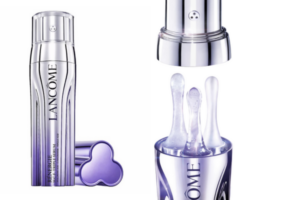
Refill-ready airless solutions, POM-free pumps made with PCR and/or mono-materials: in dispensing, as in other markets, sustainability is a top priority. In the luxury space, however, performance and experience-based added-value remain fundamental. Read on for a technical view of the latest pumps to hit the market.
Reinventing airless
Airless jars (Berlin Packaging and Lumson), airless paper packaging (Lumson), airless glass (Baralan’s DEA line), airless doypacks (Texen), customizable airless solutions (Quadpack’s Canvas line): airless systems are ubiquitous. They offer multiple advantages when it comes to guaranteeing long-term product integrity. This is especially important given that the most vulnerable formulas—those without preservatives—are bound to multiply. Riding the high-end trend, Lumson has developed a glass version of its Envers airless jar. “Envers Glass was developed for high-end skincare,” explains the supplier. “Equipped with a multi-layer pouch and a PETG lid, it also has a rotating, “on-off” open-and-close mechanism and is available in a 50ml format.” Envers Glass can be customized with all types of decorations and once the container is empty, its elements can be separated for recycling.”
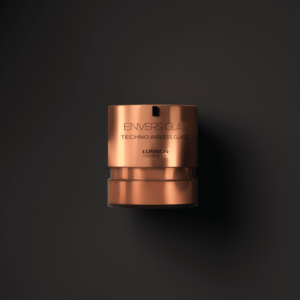
The same is true of Berlin Packaging’s Airglass Jar (30ml and 50ml formats), which can be disassembled. This year Lumson co-designed the first airless paper dispenser with Pusterla 1880, called XPaper. The pouch system is nested into a cardboard cylinder, with no adhesive, and can be separated from the sleeve for recycling, offering an eco-alternative to plastic. Texen’s recent acquisition of PRP Création’s pouch and doypack activity will enable the company to focus on flexible airless packaging. Senior Vice President, Sales, Marketing & Innovation Pierre-Yves Quéfélec explains: “We’re rethinking the airless pouch system by freeing it from a purely functional role and elevating it to a 100% prestige, self-sufficient solution.” The concept will be available in rigid and flexible versions, some with refill options, and with much lower plastic content. “We are currently working on the constraints of films and the requirement that decorations be sustainable and enduring.”
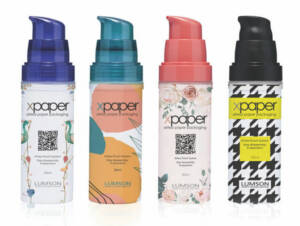
The refill challenge for skincare
Brands have developed their eco-strategies around reloadable and refillable solutions, which implies meeting various challenges—not least of these is developing ease of use. “A dispensing system that isn’t practical is a major barrier to repeat purchases: using a refill shouldn’t be a chore for the consumer,” remarks Patrick Bousquel, Marketing Director Beauty EMEA at Aptar Beauty + Home.
This is especially true given that a refill doesn’t have the same appeal as the original product. “We have to increase the appeal of refills; they should be elegant enough not to damage brand equity, but not so much so that they are perceived as products that can be used on their own.” Aptar is tackling this challenge with its Gaïa airless range, which emphasizes the system’s intuitive nature: the pump remains attached to the bottle, and the refill cartridge is inserted and removed via the bottom of the case with a simple pressing gesture. The company has adapted this cartridge-based device to a refillable version of its Serumony airless droppers.
Similar developments are underway at Quadpack: the company has released a refillable version of its Regula Airless— equipped with a patented snap-on ring that prevents the bottle from coming apart—available in 100% PP or PCR (excluding pump) versions. The main pieces can be unscrewed for recycling and/or refilling. Asquan’s Easy Airless is designed for refills: available in 100% PP ou PCR (excluding the pump), the user unscrews the parts to recycle or refill the pack. Similarly, Baralan has released a refillable version of its DEA line featuring a glass container that can be removed for refilling.
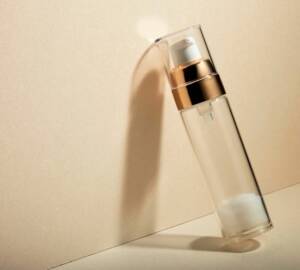
Bodycare sprays go premium
Silgan Dispensing has announced the launch of the Mark VII Max Blossom for the first half of 2023. Developed for the deodorant, and hair and body spray segment, this new technology for Mark VII Max screw-on pumps (compatible with the supplier’s Inverted upside-down pumps) will be added to the SP22 Panache Pulse and Sinfonia Infinite.
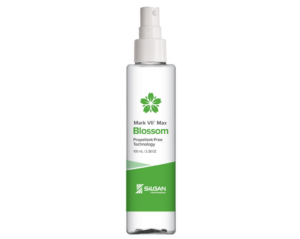
Étienne Brière, Senior Marketing Manager, Fine Mist and Aerosols, at Silgan, explains: “Brands are increasingly demanding alternatives to aerosols, which don’t really convey the idea of naturalness associated with companies that are increasingly focused on bio-sourced formulations. A solution without propellant gases enables brands to be coherent, while the Blossom’s pulverization technology, which delivers generous doses of ultra-fine droplets, offers a more premium experience than aerosol. Brands are also freed from the design and finishing constraints associated with aluminum containers, enabling them to deliver an enhanced aesthetic and sensory experience.

